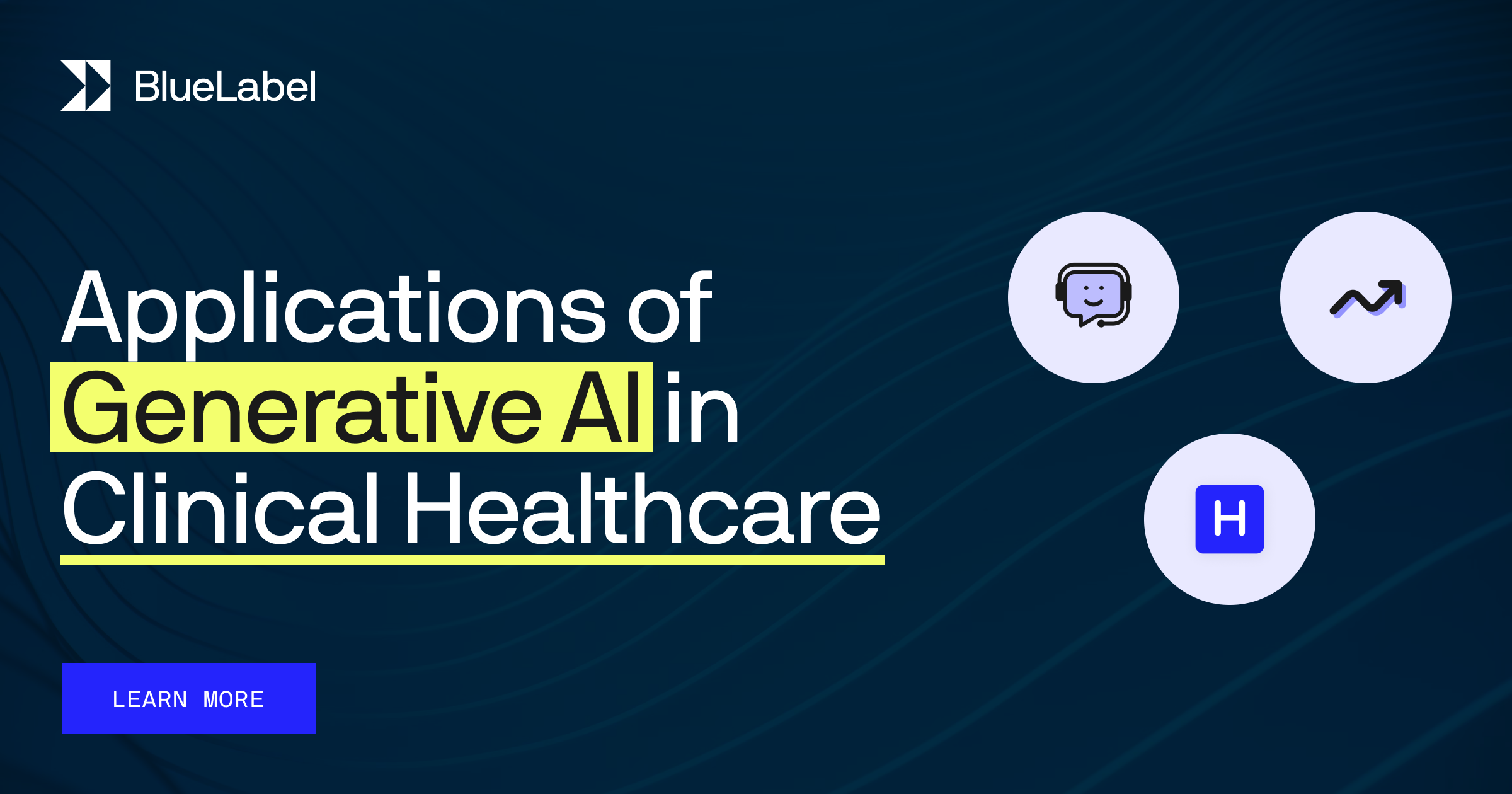Revolutionizing Healthcare: The Opportunity for Generative AI in Clinical Care
The healthcare industry, in particular hospitals, clinics and physician groups, are continuously seeking innovative ways to improve patient care and streamline operations. Generative AI, a rapidly advancing field within Artificial Intelligence (AI), holds tremendous potential to revolutionize clinical healthcare by enhancing patient satisfaction and increasing efficiency in various aspects of clinical operations.
The application of AI to clinical medicine is nothing new; for years, significant effort has been made to use machine and deep learning AI to help with diagnoses and treatment of patients. While the utopian vision of an all-seeing AI that can spot cancers in a CT scan that a physician might miss is alluring, in practice, using AI to diagnose and treat patients is still fraught with the risk of misdiagnosis and its potential consequences.
Rather than attempt to use AI to play the role of a physician, instead a much more practical application of AI in a clinic, is to leverage Large Language Models (LLM) it to put more information and power into the hands of a patient and to ease the tremendous administrative burden carried by physicians, nurses and clinical staff at hospitals and physician groups across the country. This blog post will explore practical ways to apply generative AI in a clinical setting today without having AI attempt to play the role of a physician.

Improving Patient Satisfaction through Generative AI-Assisted Self-Service Chatbots
One of the most significant challenges in healthcare is addressing patient dissatisfaction due to perceived neglect. Patients often feel that healthcare providers do not hear them or provide sufficient information about their treatments and medications. The rapid adoption of patient portals since 2020, in particular patient messaging has ironically contributed to increased dissatisfaction as the increased volume of patient messages results in additional workload on physicians and support staff, which leads to delays in responses and increased patient dissatisfaction.
A study by the American Journal of Family Medicine indicated that non-urgent messages, such as those related to administrative tasks or simple clinical questions, often make up the majority of patient portal interactions. Today the burden to answer these falls onto already overstretched clinical staff.
Generative AI chatbots integrated into patient portals offer a powerful solution to this problem. These chatbots can provide patients with instant answers to common questions about their treatments and medications without requiring a physician’s intervention. For example, Google’s recently introduced research AI system, AMI (Articulare Medical Intelligence Explorer), has demonstrated diagnostic accuracy, empathy, and helpful explanations on par with or even surpassing real primary care clinicians in simulated text consultations with a generative AI powered chatbot.
GenAI Chatbots Can Help Patients Interpret Lab Results
Generative AI can also provide context and explanations for lab results published on patient portals. For instance, a fertility clinic might publish an Anti-Mullerian Hormone (AMH) measurement for a patient to view, with no more than a simple table to help the patient interpret the result. However, almost immediately a patient will likely want to know “is that high?”, “is that low?”, “what does that mean?!” Off-the-shelf open source LLMs can easily answer these questions without requiring any sensitive patient data or integrations into an Electronic Health Records (EHR) system, as this is general-purpose knowledge.
Provide After Hours Patient Assistance In Lieu of the On-Call Doctor
Moreover, generative AI can offer after-hours support for patients seeking advice on symptoms and general questions about medications. Today, a patient would likely need to call the on-call number for their clinic, only to then have to wait by the phone for the on-call nurse or physician to call them back. By empowering patients through a self-service chat interface, clinics can improve patient satisfaction by providing the information they need promptly and drastically reduce the inquires fielded by their on-call nurses and physicians. Finally, reducing on-call volume significantly boosts clinical employee satisfaction because fewer physicians and nurses need to be on-call at any given time.
Translate Patient Instructions to their Native Language
Another benefit of generative AI in healthcare is its ability to translate lab work, progress notes, and patient instructions into the patient’s native language. A study has shown that patients who require an interpreter or do not receive care in their preferred language report lower satisfaction levels. Generative AI’s exceptional language translation capabilities can eliminate the need for translators and reduce confusion for patients who are not fluent in the language of their clinical team. The use of generative AI for translation is another low-risk application of the technology in the clinical setting.
Generative AI Can Increase the Efficiency of Clinical Operations
Generative AI can significantly increase the efficiency of clinical operations by automating various tasks. One such application is generating consultation notes, referral letters, and progress notes from transcripts. A study conducted in 2016 found that Physicians spend roughly 50% of their time on EHR tasks and desk work, with only 27% of their time dedicated to patient care. Further, a study of 4,938 progress notes showed that the average length of 886 words and a significant portion of these notes were highly similar from one to the other due to practices like copy-pasting, which can introduce risks and reduce the usefulness of the notes.
Automate the Creation of Progress Notes and Referral Letters
The rise of telemedicine after the 2020 pandemic has led to a greater number of physicians conducting consultations over Zoom or other remote solutions. These services today produce AI generated transcripts and summaries of these calls. Clinics can largely automate the production of referral letters, progress notes, and other routine documentation by using the transcripts of these meetings coupled with a generative AI agent. Generative AI can eliminate a substantial time burden on physicians and reduce errors by automating the process of creating these documents, which currently rely on shortcuts to ease the burden.
Streamline Insurance Reimbursements and Prior Authorization Workflows
Another area where generative AI can streamline operations is insurance reimbursements and prior authorizations. The process of obtaining prior authorizations is costly and time-consuming for healthcare providers. A 17-hospital system reported spending $11 million annually to comply with prior authorization requirements, while a 355-bed psychiatric facility needed 24 full-time staff members solely to manage authorizations. Generative AI tools can ease this burden by automatically mapping and suggesting treatment codes and error-checking to ensure proper codes are applied. Additionally, hybrid human-AI workflows can semi-automate the process of submitting and obtaining prior authorization from insurance companies by using Robotic Process Automation (RPA) tools in combination with large language models and minimal human review.
Self-Service Appointment Setting and Patient Onboarding
Generative AI can also streamline the patient appointment booking and onboarding experience. An AI-powered booking tool can assist patients in navigating the calendars of their clinics and physicians to book follow-up appointments and consultations. This can significantly reduce the costs associated with medical answering services, which can range from $0.96 to $1.84 per call.
Risks & Challenges to the Adoption of Generative AI In Clinics and Hospitals
While generative AI offers numerous benefits to clinical healthcare, there are challenges to its adoption. Regulatory and privacy concerns are paramount in the healthcare industry. Clinical IT systems must protect patient care data, eliminating the use of third-party, cloud-hosted generative AI platforms like ChatGPT. To deploy generative AI solutions in clinical operations, healthcare providers will likely need to self-host open-source models like Llama or Mistral within their clinical IT systems.
The sensitivity of patient data requires careful consideration of any integration between an AI system and an EHR system. For all of the example use cases of generative AI solutions discussed above, none of them require access to any specific patient medical records or integration into an EHR data feed. While this type of integration would make the tools richer and more impactful, deploying them without any integration into an EHR system can still provide substantial patient value and clinical efficiency.
Another challenge is the risk of an AI disseminating misinformation. Safeguards must be implemented through fine-tuning or other means to ensure that deployed AIs do not provide incorrect advice or misinform patients when answering their questions. While these measures are effective, the risk of the AI potentially saying something incorrect cannot be fully eliminated. Therefore, any deployment of a generative AI solution within a clinical environment needs to include appropriate terms of use and protections to guard against inaccuracies disseminated by an AI tool.
Conclusion
Generative AI has the potential to revolutionize clinical healthcare by improving patient satisfaction and increasing operational efficiency. From AI-assisted self-service for patient assistance and consultation to streamlining clinical operations, generative AI can significantly benefit both patients and healthcare providers. However, healthcare providers must approach the adoption of generative AI cautiously, considering regulatory and privacy concerns and the risk of misinformation. As healthcare providers navigate these challenges and explore the implementation of generative AI solutions, they can unlock a new era of patient-centric care and optimized clinical operations.
Bobby Gill








